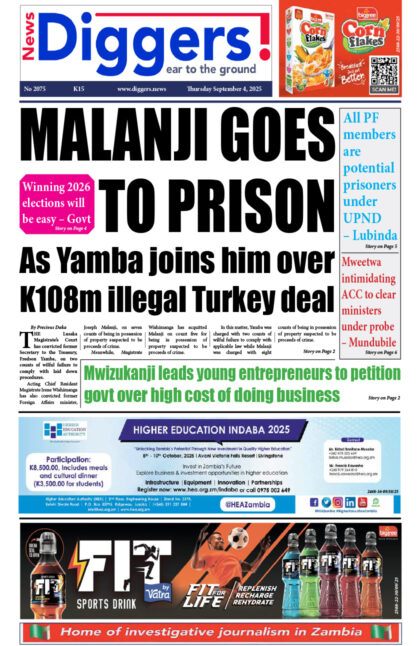LUSAKA High Court judge Susan Wanjelani has subpoenaed Drug Enforcement Commission (DEC) director general Mary Chirwa to appear in court on April 22 to testify in a case in which Lusaka businessman Valden Findlay and others petitioned the court, demanding the release of their seized bank accounts.
Judge Wanjelani has directed that Chirwa appears before court to give a testimony in the matter and also produce relevant documents in relation to the case.
Earlier, the petitioners, through their lawyers from Makebi Zulu Advocates, asked the court to summon Chirwa so that she could testify before the court.
Justice Wanjelani granted the application on Monday, and summoned Chirwa to appear before court as a witness on April 22, 2022.
This is a matter in which Findlay, his wife Dessislava and his companies have petitioned the Lusaka High Court, demanding the release of their seized bank accounts on ground that they have not been duly informed of the reasons for the seizure, or the allegations against them.
Findlay argued that the funds held in his bank accounts were derived from rental income and various business activities he has ordinarily been engaged in, with respective tax liabilities having been duly paid and which funds can easily be verified and explained.
The petitioners, Findlay, Dessislava, Dessislava Findlay (trading as D Findlay and Associates), Twatotela Properties Limited, Chrismar Earth Moving Equipment Limited and Greenview Service Providers Limited cited the Attorney General as the respondent.
But in its answer, the State argued that the bank accounts were frozen by DEC based on reasonable suspicion that the petitioners were involved in money laundering activities.
“The respondent shall say that DEC received information from a reliable source in which it was alleged that the petitioners herein illegally received huge payments from the Ministry of Finance and the Ministry of Justice respectively. The respondent shall also say that the Ministry of Finance paid out an amount of K386,265,277.00 to the third petitioner between December 1, 2016 and August 17, 2021. Premised on the foregoing, the respondent shall say that the subject bank accounts were frozen by DEC based on reasonable suspicion that the petitioners were involved in money laundering activities and there was need to safeguard the money in the subject accounts which is reasonably believed to belong to the Government of Zambia,” the State submitted.
The State argued that no communication was made to the petitioners as DEC was still investigating the alleged money laundering activities.
“Therefore, communicating intricate details about the criminal investigations would prejudice the State’s interest. DEC neither authored nor published any false, malicious or defamatory statements against the first petitioner (Findlay). The respondent shall further say that the petitioners have not been formally communicated to, engaged, summoned, arrested or charged as the DEC is still carrying out investigations. The respondent shall also say that DEC does not have any legal obligation to communicate the findings of an ongoing criminal investigation to the petitioners as doing so would not only be premature, but would also prejudice the outcome of the investigations,” submitted the State.
“DEC can only arrest, charge or warn and caution the petitioners once criminal investigations have been concluded and sufficient evidence has been found to warrant the arrest of the petitioners. The respondent shall further say that the proceedings before this honourable court are not only an attempt to gather information on the ongoing criminal investigations, therefore, prejudicing the outcome of the investigations. The respondent shall further say that one of the reasons for seizing or freezing the petitioners’ bank accounts is to prevent the petitioners from moving or dealing with the money in the subject accounts so as not to jeopardize the criminal investigations.”
























